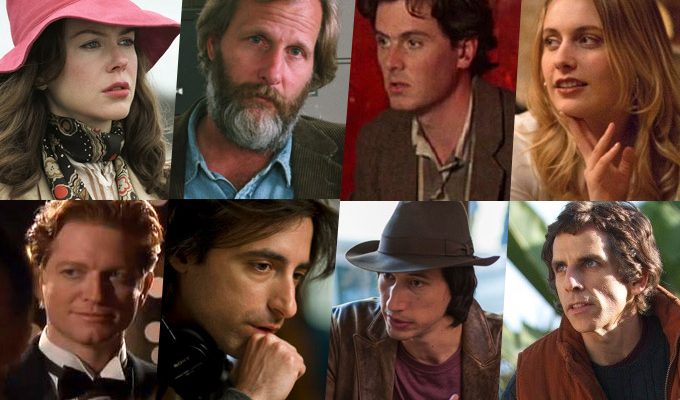 “Greenberg” (2010)
“Greenberg” (2010)
At this point, Baumbach’s career was on a steady trajectory — from “The Squid and the Whale” to “Margot at the Wedding” and then to “Greenberg” one can draw a straight, slightly downward-trending line. The filmgoers of 2010 could have been forgiven for believing that this was the Baumbach we were going to be stuck with forever, and having reinvented himself as a merciless chronicler of destructive narcissism among the white, privileged, educated chattering classes of America, he was going to turn in ever more bitter and crabbed portraits of unlikeable heroes, their self-defeating ways and their sometimes unearned redemptions. Because that’s certainly what “Greenberg” is — centering on a valiantly unsoftened performance from Ben Stiller as the titular 40-year-old washout, it’s a film that is occasionally genuinely painful to watch as its dickish protagonist continually mistakes intense self-absorption and self-importance for self-awareness, and in the process alienates almost everyone he knows. But as unstinting as the focus is on Roger Greenberg, a funny thing happens to the film that both partially redeems it for the viewer, and makes a huge amount of retrospective sense in context of the films Baumbach’s made since: Greta Gerwig. As Florence — assistant, dog walker and minder to Roger’s affluent brother’s family — Gerwig is that impossible mix of gorgeous and totally real: she oxygenates an otherwise airless story. Baumbach always had a facility for writing interesting women — even his earliest films, though told from a centrally male perspective, show the women therein as having lives outside the frame. So Florence at one point has an abortion as, amazingly, kind of a side issue, and an early fumbled sex scene has her apologize for her “ugly bra” — such details make her a person more than an object, and Gerwig just inhabits them. So even among a supporting cast that includes terrific turns from Jennifer Jason Leigh, Rhys Ifans, Brie Larson and Juno Temple and despite being second banana to an admirably uncompromising Stiller, Gerwig is so great that it’s her character’s affection for Roger that almost makes us believe he might be worth caring about. Almost. This is the sort of film that one watches and thinks, “God, I wish this was her movie, not his,” but to give Baumbach credit his very next film was “Frances Ha” which was exactly that, and more. [B-]

“Frances Ha” (2012)
When it was announced that Noah Baumbach was working on a super-secret project with a virtually no-name cast and the inspired working title of “Untitled Noah Baumbach Project,” it was a bit of a surprise. After all, he had just produced a one-two hit of moody, studio-funded chamber dramas featuring big-name leads (Nicole Kidman, Ben Stiller) who seemed intent on stripping away their movie-star vanity to revel in warts-and-all portrayals of unglamorous, perhaps even mean-spirited, broken characters. But “Frances Ha” turned out to be yet another turning point for Baumbach: a warm, fizzy confection of a movie that could almost be called musical in its rhythms. ‘Frances’ is, among other things, a joyous celebration of friendship and young womanhood that has had a tremendous influence on his more recent films like “While We’re Young” and “Mistress America” — films that feel like the work of a man who is possibly happier in life than he has ever been. Joie de vivre bursts through every shimmering black and white frame of ‘Frances,’ a breathless comedy about a young dancer played by Greta Gerwig who is apartment-hopping through Brooklyn and, seemingly, through life itself. Frances may have grace as a performer, but in her life, she stumbles. Her opportunistic best friend Sophie is ditching her for her dream apartment in Tribeca, her non-flirtations with a pair of privileged Brooklyn hipsters (winningly played by Adam Driver and Michael Zegen) are mostly cyclical and self-defeating and even a romantic trip to Paris to stay at a friend’s pied-a-terre turns out to be a bust. And yet Frances’s listlessness never turns into tedium: the film is practically bursting with invention, a film punch-drunk on exactly the sense of purpose its lead lacks, which gives the warm, if threadbare narrative a real pep in its step. And Gerwig is a joy, totally individual and modern, yet revealing the chops of a classical movie comedienne, kinda like Diane Keaton did in the early Allens. Simultaneously luminous and aloof, Gerwig anchors ‘Frances,’ imbuing the film with a lightness of touch that was decidedly lacking in ‘Margot’ and ‘Greenberg.’ While it’s a bit slighter than some of his other pictures, it’s arguably his most enjoyable – filled with endlessly quotable dialogue, pitch-perfect soundtrack choices and real heart — enough to make you want to stand up from your seat and go running down the street while 80’s-era David Bowie plays joyously on the soundtrack. [A-]

